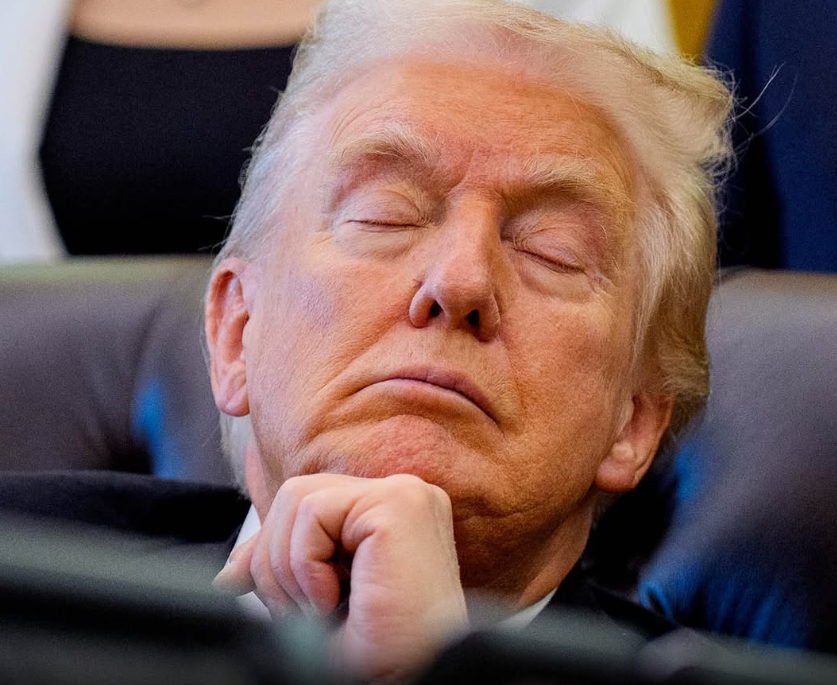A few weeks ago, Donald Trump was pictured seemingly ‘sleeping’ in his chair at the Oval Office, sparking a wave of attention across social media and news outlets. The pictures quickly went viral, with many observers assuming he had either passed out from exhaustion or simply nodded off for a brief moment. For a man in one of the most high-pressure roles in the world, even a short pause in alertness can generate headlines, and this incident was no exception. People speculated widely, wondering whether the constant demands of the presidency were finally catching up to him. The photos captured a moment that seemed almost human, a brief glimpse behind the carefully curated public persona of a sitting president. But now, Donald Trump has offered his own comments on his sleeping habits, shedding light on the story and addressing the rumors head-on.
The moment that sparked this discussion occurred on November 6, during an Oval Office press conference focused on cutting prices for a popular weight-loss drug. As cameras rolled and reporters asked questions, pictures emerged of Donald Trump with his eyes closed, appearing to be asleep or at least drowsy. The timing was particularly striking because it happened just moments before a man attending the news conference actually fainted, drawing even more attention to the president’s behavior. The juxtaposition of these two incidents—one alarming and one seemingly mundane—led to a flurry of online commentary, memes, and news coverage. It also wasn’t the first time Trump had been captured in a state of apparent rest during public events.
In May of the same year, a video circulated showing Trump during a special ceremony in Saudi Arabia, where he appeared to nod off while standing in attendance alongside world leaders. That clip, shared widely by outlets including The Daily Beast, reinforced the perception that the president occasionally struggles to stay awake during official functions. For many critics and observers, these moments raised questions about the stamina and focus required to hold the office of the President of the United States. After all, the presidency is often described as one of the most stressful and demanding jobs in the world, requiring a constant flow of decisions, briefings, and public appearances. Being alert, fully present, and ready to act is an expectation placed on any leader in that role.
Despite the optics of the photos, Trump has now addressed questions about his personal sleeping habits, seeking to clarify the situation and defend his energy levels. During a press conference in the Oval Office on Tuesday, November 18, with Saudi Crown Prince Mohammed bin Salman present, the president was asked about his approach to time management and personal rest. He had previously noted the prince’s notoriously limited sleep schedule, and reporters were curious how he compared. According to a clip shared by Forbes, Trump responded candidly, linking his own habits to those of the visiting dignitary.
“He does not sleep much, and I don’t sleep much. I think we have the same schedule. Thinking about our countries,” Trump said, framing his own work ethic as a reflection of his dedication to national duty. He contrasted his energy with that of former President Joe Biden, stating pointedly that Biden “is sleeping all the time.” Trump emphasized that being awake and alert is part of the responsibility that comes with his position. “If you sleep a lot and you’re president… no, he’s not a sleeper. I’m not a sleeper, what else?” he said, reinforcing the idea that his attention is fully committed to matters of state.
Trump went on to describe the collaborative nature of his work with Prince Mohammed bin Salman, noting that they “talk at night” and during “the craziest times,” highlighting the demands on world leaders to remain engaged around the clock. He concluded by framing his wakefulness as a reflection of passion, commitment, and love for his country: “When you love your job, when you love your country, and when you’re in a position like we are … you’re thinking about your country. He thinks about his country. I think about my country. I don’t want to sleep.” In other words, the president portrayed his limited rest not as a weakness or fatigue but as a deliberate choice born from dedication to leadership and responsibility.
Whether one interprets these comments as reassurance or as part of the ongoing public persona, Trump’s response underscores a broader point about the pressures of high office and the perception of energy, focus, and stamina in world leaders. For critics, the images may remain emblematic of human vulnerability, while supporters may see them as evidence of tireless commitment to governance. Either way, the discussion highlights how even small, seemingly ordinary moments—like a brief nap in a chair—can spark national debate when they involve the leader of the free world.
